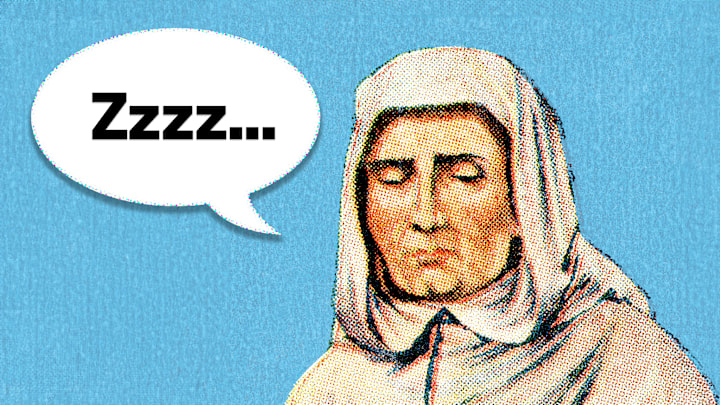The nursery rhyme “Frère Jacques,” also known as “Brother Jacques” or “Brother John” in English, tells the tale of a monk who is being summoned to ring the bells, which he seems not to have done yet because he’s still asleep. The French lyrics are:
“Frère Jacques, Frère Jacques
Dormer-vous? Dormer-vous?
Sonnez les matines! Sonnez les matines!
Din, din, don. Din, din, don.”
While the song seems to tell a simple story, “Frère Jacques” has actually been the source of more debate over the years than you might expect, from disagreements over the most accurate translation of the lyrics to speculation over whether the central character was inspired by a real-life figure to the possibility that the true author of the music was one of the most important French composers of the 18th century. Here’s a look at the story—and some of the unanswered questions—behind the nursery rhyme we know today as “Frère Jacques.”
- Who Wrote “Frère Jacques”?
- The Meaning of “Frère Jacques”
- Who Was the Real Frère Jacques?
- The Influence of “Frère Jacques”
Who Wrote “Frère Jacques”?
The origin of the song “Frère Jacques” isn’t entirely clear. According to American Songwriter, the melody seems to have first appeared under the title “Frère Blaise” in a manuscript called “Recueil de Timbres de Vaudevilles” that dates back to around 1780.

Research into who composed that music has identified one of the most notable 18th century composers as a candidate. In 2014, the classical music scholar Sylvie Bouisseau presented a research paper arguing that the music was written by the French composer Jean-Philippe Rameau. Among other evidence, Boisseau notes that Jacques Joseph Marie Decroix—a collector of scores who compiled a number of Rameau’s works that were given to the Bibliothèque Nationale de France—included it in a manuscript of canons and attributed the music to the composer.
In addition, Bouisseau pointed out that the first time the music appeared in print (as opposed to the handwritten form of the 1780s manuscript) was when it was published in 1811 by the Société du Caveau, a group of composers that counted Rameau as a member. This added further credibility to the idea that he may have been the composer of “Frère Jacques”; his membership would explain why the group was in possession of the music. That said, Rameau died in 1764, and the music wasn’t published until almost half a century after his death—raising the question of why the society would have kept a piece by such a renowned composer under its hat for so long.
The Meaning of “Frère Jacques”
In addition to the questions surrounding its authorship, the meaning of “Frère Jacques” has been muddled over the years thanks to translations of the lyrics from French to English.
Some early English versions of the rhyme, for example, turned Frère Jacques into Brother John. But John isn’t the direct equivalent of Jacques in English; it’s a closer match for the name Jean, with Jacques having more similarity to Jack.
The third line, “Sonnez les matines,” was also once translated as “Morning bells are ringing”—but that doesn’t accurately communicate the situation to which the poem is alluding. This is because matines has sometimes been mistakenly translated as a reference to “morning,” due to the word’s similarity to matin, which translates to “morning” in French. But matines actually refers to a canonical hour in Christianity which takes place in the early hours of the morning. The summons to “ring the matins” is therefore a call to ring the bells to usher in this period for prayers. A more recent English language version translates the line as “ring the matins,” which is a more accurate version of the original.
Who Was the Real Frère Jacques?
There has also been speculation about whether the title character of the nursery rhyme was inspired by a real person. Some have theorized that the real Frère Jacques was Jacques Beaulieu, a pioneering lithologist who sometimes wore a monk’s habit and referred to himself as Frère Jacques, even though he wasn’t actually a monk. He was one of the first to take a lateral approach to perineal lithotomy (a surgical operation for the removal of calcium deposits like kidney and bladder stones via the perineum) and performed around 5000 lithotomies over the course of his career.
But a 1999 research paper into the history of the real Beaulieu didn’t find a direct connection between him and the nursery rhyme character, instead concluding that the rhyme was more likely to refer to a number of monks who were prone to oversleeping.
The Influence of “Frère Jacques”
Whatever the truth about the origins of the rhyme, “Frère Jacques” has been influential in a number of ways.
The melody has been important to the legacy of classical music—and that would be true whether Rameau composed the music or not. “Frère Jacques” became an inspiration to the composer Gustav Mahler, who knew it by its German name, “Bruder Martin”; he used the melody in the third movement of his Symphony No. 1.
It also has its place in music history outside of the classical genre: George Harrison and John Lennon slipped “Frère Jacques” into the Beatles’ song “Paperback Writer” (listen carefully during the third verse).
It’s in its nursery rhyme form that “Frère Jacques” is most frequently heard today, and it’s sometimes cited as a good choice to use for educational purposes. Leonard Bernstein, for example, asked the audience at one of his Young People’s Concerts to sing the rhyme as a way to illustrate how sequence can be used in composition.
A 2019 survey even suggested using “a musical mnemonic” based on the song, which, according to researchers, “can help learning and remembering of the proper [handwashing] technique.”
Read More Articles About Nursery Rhymes:
